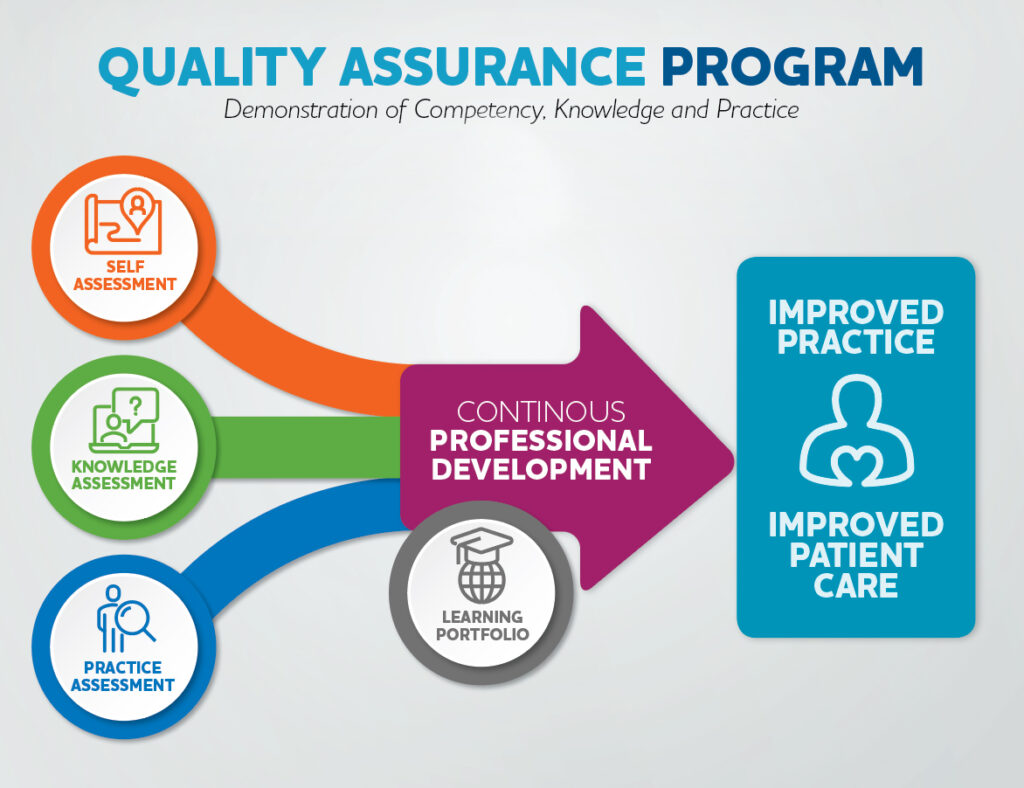As part of the College’s Quality Assurance (QA) Program, pharmacists and pharmacy technicians are selected to undergo routine practice assessments. The assessment is an evaluation of individual performance and occurs in the place of practice with a College practice advisor.
Registrants may have misconceptions about the what, when, why and how of practice assessments – here are six of the most common myths that we hear.
Myth: Practice advisors don’t have real world pharmacy experience.

FACT: All College practice advisors are practicing Part A pharmacists or pharmacy technicians. This enables them to use peer-to-peer coaching and provide constructive feedback in a collaborative environment.
Myth: The practice assessment is an assessment of my clinical skills.

FACT: The practice assessment focuses on the processes used to deliver patient care, in alignment with the standards of practice. Pharmacist practice assessments focus on patient assessment, decision making, documentation, and communication and education. Pharmacy technician practice assessments focus on patient care support activities, collaboration and decision making, documentation, and communication.
As part of the QA Program, Part A pharmacists are also required to complete the Knowledge Assessment, an open-book case-based online exam that assesses pharmacists’ ability to apply their clinical knowledge and their knowledge of current legislation and ethical obligations to everyday patient care.
View the Quality Assurance Model Infographic
Myth: The College is specifically selecting me to complete a practice assessment.

FACT: Registrants are randomly selected to undergo a routine practice assessment
Myth: I don’t get anything out of a practice assessment.

FACT: The practice assessment is focused specifically on your individual learning and development with the goal of optimized patient care. Through these assessments, you can evaluate your knowledge, skills, and abilities in various aspects of pharmacy practice.
In addition to the coaching and conversation with the practice advisor during the assessment, you’ll also receive feedback in a report that you can use to validate what you are already doing well, identify opportunities for further education and skill development, and enhance safety and quality within your place of practice.
Myth: Practice assessments are meant to discover what I’m doing wrong in my practice.

FACT: The intention of practice assessments is to increase adherence to practice standards, help you practice to full scope, and support optimal health outcomes for patients. The insights you gain from your assessment can be used to implement evidence-based practices within your pharmacy and ensure your patient care aligns with standards.
You’ll be provided with feedback outlining areas of practice where you are doing well and meeting standards, as well as areas where there is an opportunity for improvement. The advisor will offer support through coaching and conversation, pointing out opportunities to enhance practice, probing the thinking behind certain actions and decisions, and indicating where to access helpful resources.
Myth: If I don’t pass the practice assessment, I’ll lose my license to practice.

FACT: The process is not intended to be punitive. If you do not meet the standards required on your first practice assessment, you will be given the opportunity to spend time with a quality assurance coach.
This coach is not a College staff member, but rather a pharmacy peer who is trained by the College on how to coach for change. The coach provides support specifically in areas where there is room for improvement and reinforces areas where you meet the standards. This three-hour collaborative coaching session focuses on your specific practice and assessment. Working with the coach provides opportunities to discuss strategies and practical suggestions on how to implement changes to enhance your practice and the care you provide to patients. Following coaching you will be reassessed by a different College practice advisor.
If your second practice assessment identifies significant areas that require improvement, you will be required to undergo a QA assessment by a College-appointed peer QA assessor (this does not affect your ability to practice). The QA Committee will review the results of the QA assessment and recommend required remediation based on your needs. You will then be required to complete a post-remedial practice assessment within one year of your QA assessment.
The results of a practice assessment are confidential and are not shared with employers, pharmacy owners or colleagues. The results are only provided to the QA Committee as outlined in the process above.














